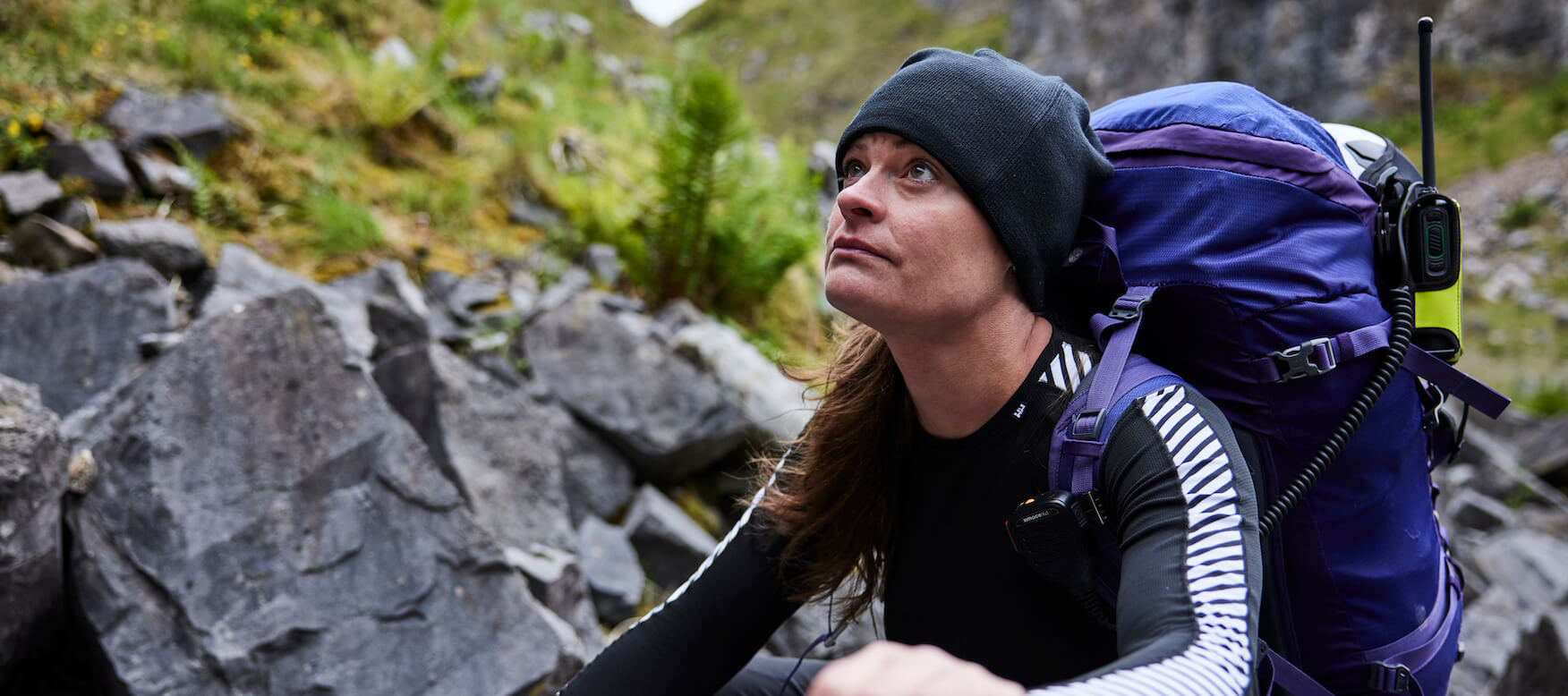
A Mountain Rescuer’s Journey Living with a Chronic Health Condition
July 18, 2022
8 min read
The mountain is a place where we can all belong. No matter who we are, or where we’re from.
Kate Murray is a mountain rescue volunteer for the Western Beacons Mountain Rescue Team, and her journey dealing with endometriosis, a chronic health condition, to get to where she is today, took a lot of trust and belief in herself. Here is Kate’s story:
I have always had a love of the outdoors since childhood. Early memories were mostly of adventures in the Cambrian mountains and Peak District. Picnics, rock hopping, hill walking and feeling at home outside. When I went away to university in an urban environment, I missed the exposure to nature I'd become accustomed to on my doorstep growing up. Tarmac replaced trees and buildings replaced boulders. It only made me appreciate the mountains even more, when I came back.
After finishing university and returning to Wales, unfortunately, due to health problems throughout much of my twenties (with, at the time an undiagnosed chronic health condition), I was severely restricted in terms of my mobility, activity and ability to explore and enjoy the outdoors for a number of years. My condition was more around dealing with pain and not feeling "normal” by my standards of how I usually feel. Trying to manage pelvic pain that I couldn't explain and that didn't go away. It felt like fingers digging into my groin and made simple things like sitting and walking very painful. Irregular bleeding was also a cause for concern to me. I didn't give up. After years of too many hospital appointments to count, multiple surgeries, daily pain management and finally diagnosis, I began the long path of starting to reclaim my life back, this time with a much deeper appreciation of what seriously matters and where I wanted to be – and that was outdoors and in the mountains, which I'd missed so much.
.jpg)
the diagnosis
It's all a bit of a roller coaster, so how I handled the news of my diagnosis is a bit of a blur and it's still something I'm trying to handle and get my head around to this day if I'm being honest. Before the surgery that led to my diagnosis, I had spent so many years without answers about the cause of my chronic pain. Having spent all this time seeing various consultants across a number of different specialist departments, all suggesting possible causes, raising my hopes of a diagnosis but also raising my concerns as I read up what the suspected conditions were and what that might mean if that was my diagnosis – only for tests to come back negative, followed by mixed feelings of relief – "it's not that, that's good" – but also disappointment that I was still none the wiser to the actual cause. After years of this I was starting to lose hope that I'd even find out the cause and even began to think "is it me? Is this all in my head? Am I going mad? The doctors can't find the problem, am I the problem?"
I credit my new gynecologist consultant at University Hospital of Wales, who I was referred to for helping me get my diagnosis. He came to my case with an open mind and said we'd do surgery to have a look at things. I remember him saying that I'd go in for another laparoscopy. They would make two incisions near my belly button for the cameras to have a look around. So if I wake up and I have two bandages, that's what those are from. I remember him saying if I had three or more bandages, that most likely is because they've found something, so will need to make more incisions to look at the issue better and treat it if possible.
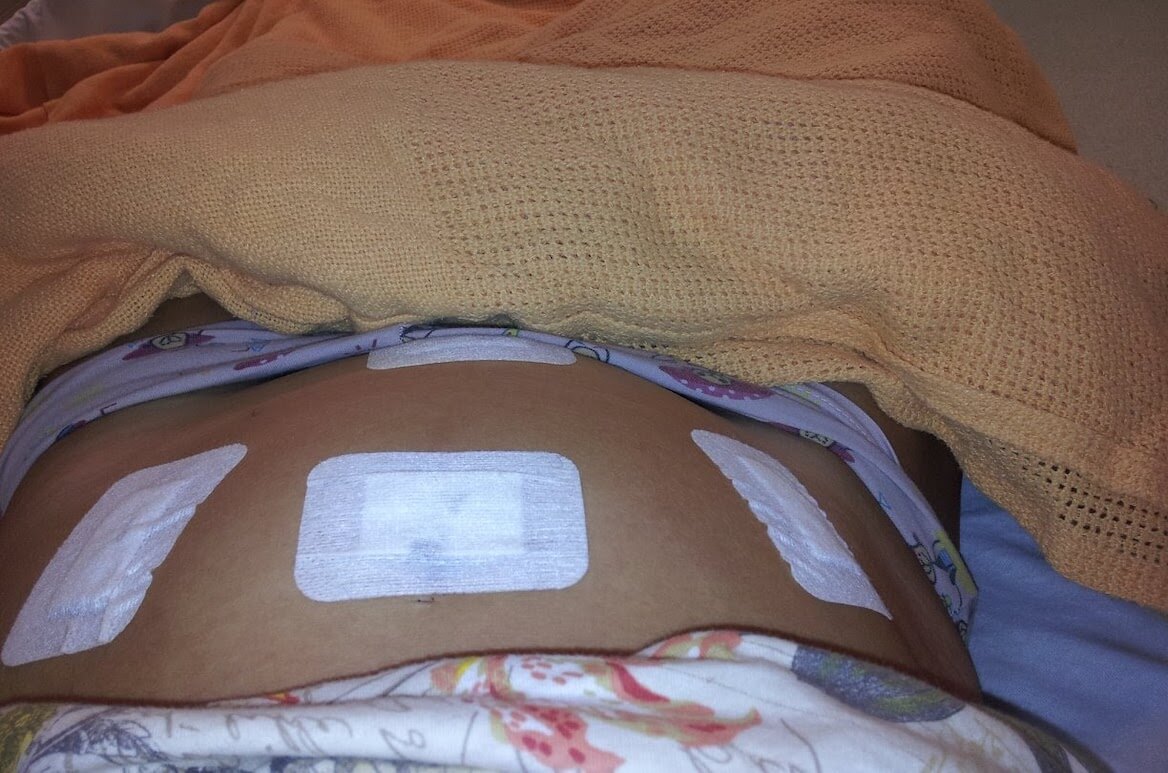
I just remember coming around from my anesthetic, groggy and not really feeling ‘with it’ but looking down at my stomach and seeing 4 bandages. Although I had no idea at that moment what they had found or what was wrong with me, I remember the relief that they had found something. I wasn't crazy and it wasn't in my head. Hope and relief overwhelmed me – groundhog day had been broken. I had to wait until the consultant was available to give me more information and that's when I had the news about endometriosis. I can't remember most of that conversation. Thankfully I had my mum there who helped me remember key bits of information.
Since then I'd say handling my diagnosis is something I'm still trying to do each day. I have good days and bad, but I try to remain positive. For me, knowing is better than the uncertainty and limbo of not being diagnosed. But the diagnosis comes with its own daily battles.
I am very lucky that I have an extremely supportive network of friends and family, (by family I mean both my relatives and also my mountain rescue family) all of whom I am very lucky to have and who support me more than they probably realize. One person who does stand out though, as she was at my side throughout, usually in person for too many hospital consultations, surgery and appointments than I can remember but who also helped push for answers from the medical professionals when my fight was being exhausted and draining – that person is my mum. She was my rock and strength throughout all of this.
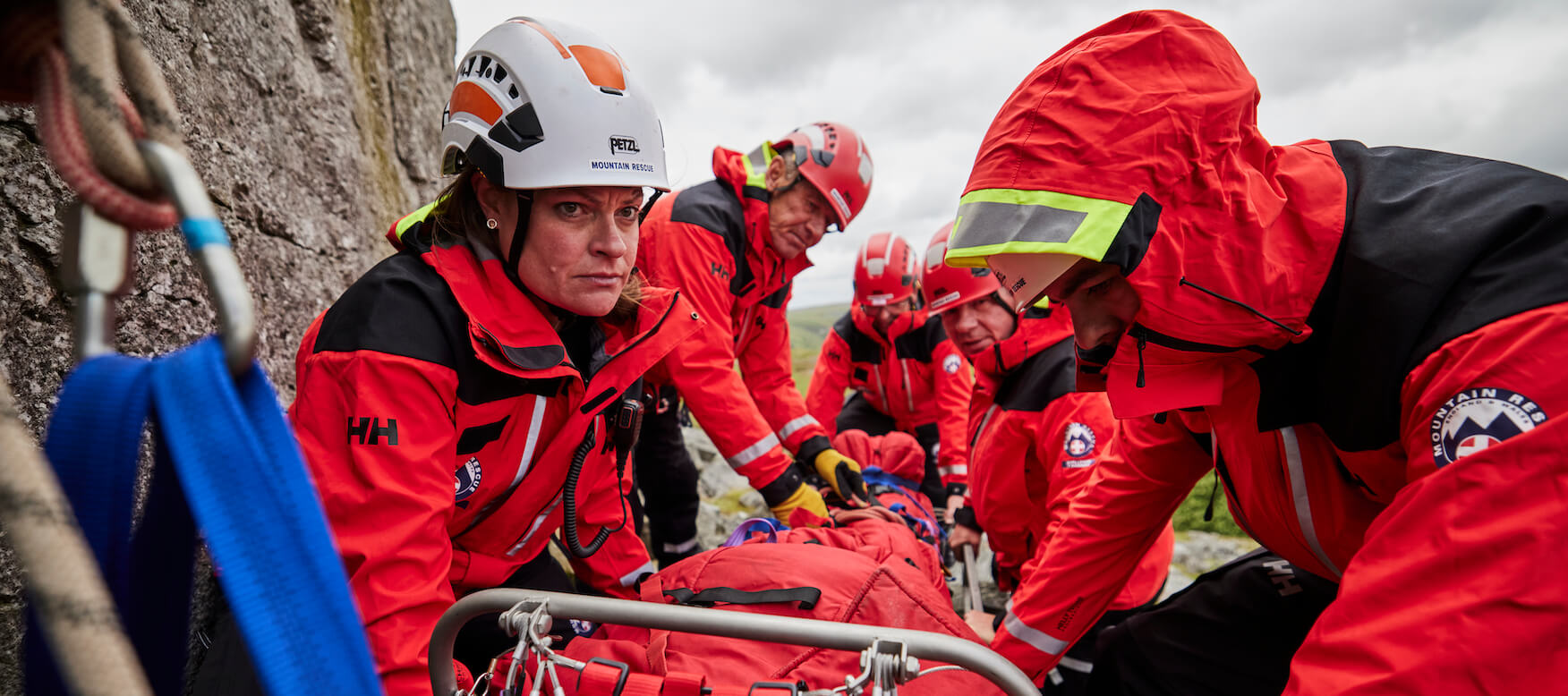
Living with endometriosis
It has been a long battle to get where I am today. Years in physiotherapy, relearning the basics like balance and how to walk properly to avoid further injury due to bad posture from years of limited mobility. Rebuilding confidence and regaining exposure to the outdoors.
Post diagnosis was a bit of a blur and a strange time. Trying to get things back on track, adjust to the new medication, come off the prescription painkillers, readjust and heal. Time both went really quickly in some respects but also felt like it was taking an age in others as I wasn't progressing as much as I would have liked. I had a combination of NHS physiotherapy but also paid privately to see physiotherapists, chiropractors and other professionals to help build core strength and balance, as well as mobility. Learning how to walk properly again was frustratingly slow. I remember being asked to do what sounded like really simple tasks, like walking along a straight line but when I came to do it, it was really hard, so we'd take a step back and try something simpler. There were a lot of two steps forward, one step back, so to speak both literally and metaphorically. I just remember getting annoyed at myself. I was going in the wrong direction at times.
I don't have physio anymore but I have invested in a personal trainer who is aware of my condition and helps me to continue to build core strength, work on my posture and mobility and is really great and flexible at working around me in terms of my good and bad days.
I’ve been on various hormone treatments to manage the condition for years. These have been amended slightly over time, when one type of treatment appears to stop being so effective. I'm also on prescription painkillers which help manage the pain on days I'm not feeling so well. In 2020, after a number of years managing my condition relatively well, I had another painful flare up. This resulted in another admission to hospital and change in medication and hormone treatment which has helped a bit. I’m currently awaiting surgery to see what a longer-term solution might be. Whilst not quite there yet, discussions of a possible hysterectomy are also being seriously considered. It’s scary but the thought of being on pain killers for life also daunts me.
That's the physical symptoms of the condition.
The condition also has an impact mentally, particularly due to the hormone medication. I try to keep this in check by being self-aware and trying to be kind to myself. Acknowledging that if I'm having a rough day and I'm overly emotional is as likely to be down to medication rather than anything else. Understanding when to take a step back and not put too much pressure on myself is important. I don't always get this right and sometimes do push myself too hard and put too high an expectation on myself. But like life in general, keeping things in check is a daily challenge – I'd like to think I manage as well as I can.
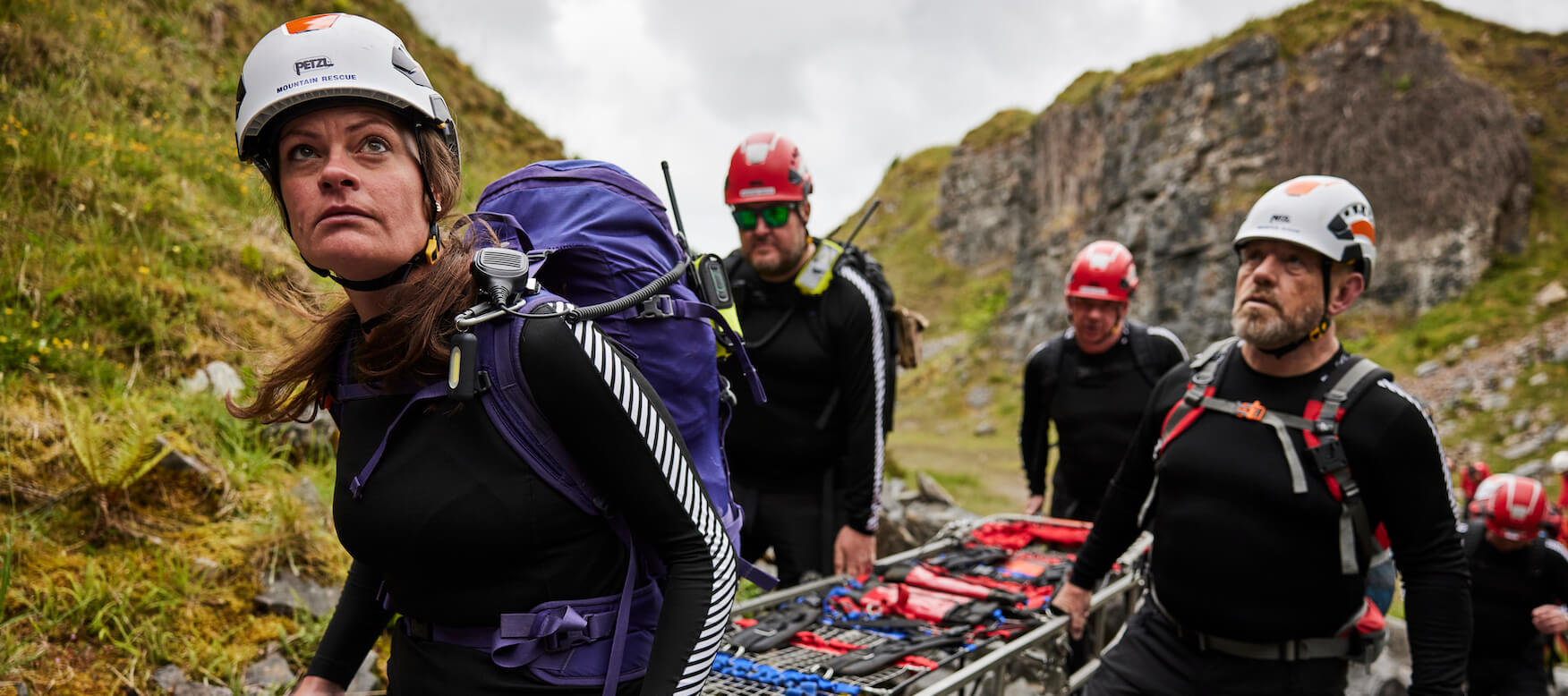
Joining Western Beacons Mountain Rescue Team
I've come a long way since my diagnosis in 2014. I've re-immersed myself in nature and the outdoors. I joined mountain rescue in January 2019 and worked closely alongside Western Beacons during that time. I became a member of Western Beacons team in September 2020
It is difficult to express the positive impact the mountain rescue community has had on me. I've made some good friends in Western Beacons and the wider mountain rescue community more generally – as teams work closely together, you form friendships. I socialize with teammates outside of the formal training and call-out settings. Hearing their own stories and backgrounds does inspire me and gives me strength. Everyone brings different experiences and skills to the team and willingly shares those skills to help develop others socially, as well as professionally. Before joining mountain rescue I'd never rock climbed. After years of immobility, I thought it was just a dream, but with encouragement, support and guidance from some friends in Western, they taught me how. Their investment and belief in me is one example of how this community helps develop me and support me continually. Being part of a climbing weekend with friends from Western back in autumn 2020, climbing Cadair Idris, is up there with my top achievements.
In Western Beacons we have a Volunteer Care Team (VCT) – the team is made up of two WBMRT volunteers, Geraint and Mike, who are there to provide support for their fellow team members. Both are ASIST trained as well as also being Mental Health First Aiders (MHFAs), amongst their other qualifications. The VCT are passionate that people always have somewhere they can turn to, however bleak things may seem and is available to those who sometimes just feel the need for a bit of moral support, or more if required. The VCT has been a particularly helpful support network over recent months as my health has fluctuated. My team has been great, flexible and understanding when I’ve needed to take time out from operations, on days I don’t feel well and on days I’m fit and well, they embraced me without judgement or condescendence. I couldn’t ask for more.
In mountain rescue, you have to rely on your colleagues as we are a team, but it's a choice to rely on those colleagues as individuals outside of mountain rescue and develop those relationships socially. This community is a support network I'm privileged to rely on both professionally and socially and hope I do the same for others too.
I don't take any day for granted and instead, make the most of each day I can be active. I don't unnecessarily put things off that can be achieved in the here and now. I live with endometriosis daily and always will do, I'm thankful that with medication and other treatments, I'm accomplishing my dreams.
Condition aside, I live a healthy and very active lifestyle these days. Amongst other things I've completed numerous international marathons, trekked to Everest base camp, solo hiked through the French, Swiss and Italian Alps, rock climbed terrains I never thought I'd do but I'm far from done yet.
Since getting my mobility and confidence back I've found that my biggest sanctuary is mountains and being around like-minded people who also appreciate the wonders of the mountains. It's my happy place.
Deciding to join mountain rescue a couple of years ago is one of my best life decisions. Through being around others who share my passion for the outdoors and drive to develop themselves, learn new skills to help support and be there for others in need, I've found my second home and an extended, inclusive family of like-minded souls who all help each other.
To find out more about Western Beacons Mountain Rescue team and other amazing volunteers like Kate, please visit: Western Beacons.
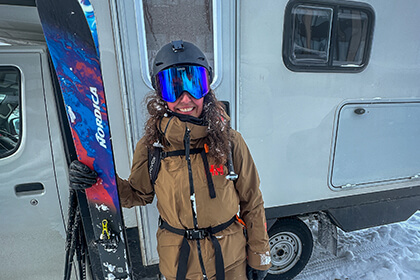
October 21, 2025 10 min read
How to plan your ski trip to Japan
Skiing Japan with Nat Segal: Hokkaido RV adventure, volcano tours, and how to thrive through a dry spell.
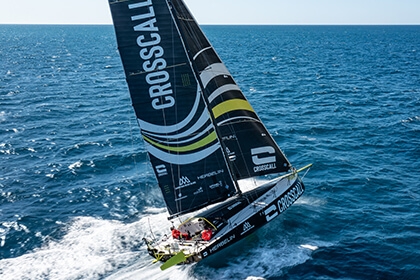
October 21, 2025 4 min read
Transat Café L’OR 2025: A Modern Classic of the Ocean
A double-handed Atlantic sailing epic blending grit, innovation, and coffee-route heritage.
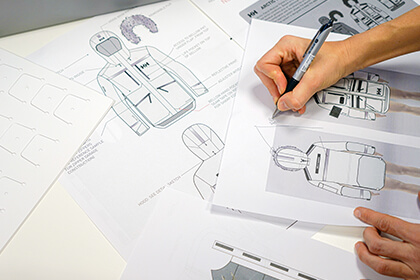
September 29, 2025 4 min read
Behind the design: The Arctic Patrol Down Parka
An inside look at how Helly Hansen designed the Arctic Patrol Down Parka with insights from Arctic scientists for extreme conditions.
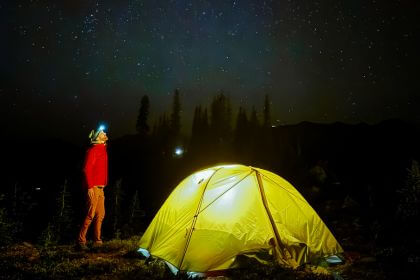
August 28, 2025 5 min read
Camping Under the Stars: an Open Mountain Month Experience
Part of Open Mountain Month, The Summit Sleepover is the definition of an experience money can’t buy. Dive into Andy and Anna from Roam and Create's experience at this year's edition.